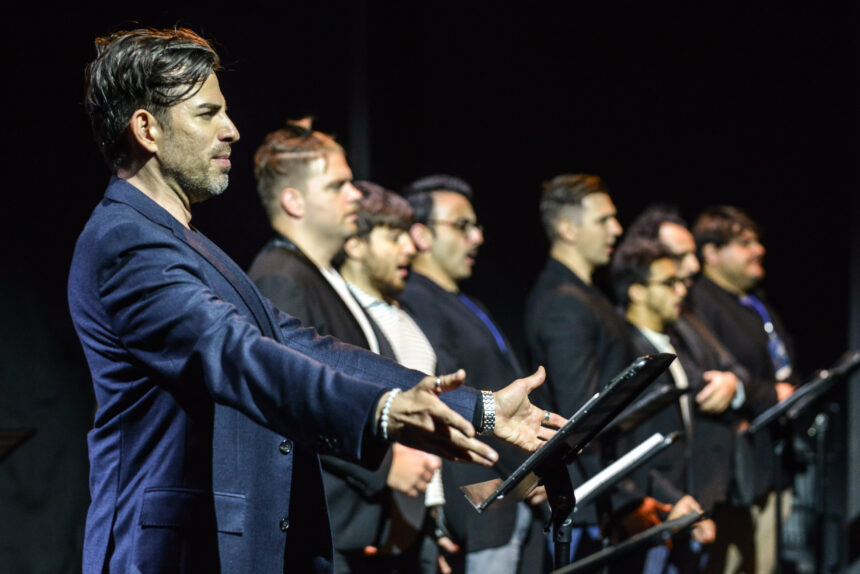Starring Stefano Massini; Michele Spotti conducting the Orchestra del Teatro Petruzzelli di Bari; Davide Gasparro authors the mise en espace
Franco Punzi reaches his 40th year as president of the Festival
Palazzo Ducale, Martina Franca Tuesday 14 July, 9pm
Live streaming on the Web TV of the Fondazione Paolo Grassi and on Italiafestival.tv
Il borghese gentiluomo by Richard Strauss opens the 46th Fetival della Valle d’Itria, Tuesday 14th July at 9pm in the Palazzo Ducale of Martina Franca. This rare piece by the German composer is performed in thr 1917 edition, with libretto by Hugo von Hofmannsthal, based on Molière’s commedia. Quirino Principe, one of Strauss’ top experts, is the editor of the rhythmic version in Italian. Thus the 2020 edition of the Apulian Festival takes place, with its title Finding the thread, set around the myth of Ariadne from its classical sources to 20th-century masterpieces.
2020 marks an important accomplishment for the Festival: the 40 years of presidency of Franco Punzi, who was nominated to lead Martina Franca’s yearly event in 1980. It was Paolo Grassi who selected him: Grassi is a character inextricably connected with the Festival right from its beginnings, and our work is constantly inspired by him and his view of culture.
This new edition of the Bourgeois Gentilhomme – a text which is critical and analytical of society – is made even more precious by our collaboration with Stefano Massini, one of today’s top theatre playwright, and artistic advisor for Milan’s Piccolo Teatro. We have commissioned him three monologues, loosely based on Molière, to talk about our contemporary world. Massini’s excerpts will be inserted within the plot of the opera as a sort of ‘magnifying glass’ on the role of money in today’s world, on the role of the artist, and on theatre: «Four centuries ago – Massini explains – Molière wrote a play on a wealthy bourgeois, who in order to feel accepted by his entourage wants to take lessons in music, dance, philosophy. In the past, at least since Petronius’ Satyricon, the rich felt duty-bound to improve themselves. Money helped, of course, but it had to be denied somehow: money was dishonour, the ‘devil’s dung’. Today money is something to show off; there no longer exists the rich person described by Carl Barks in 1947 when he invented Uncle Scrooge, inspired by Charles Dicken’s A Christmas Carol: a lonely, isolated individual, without a wife, hidden in his fortress with the symbol of the dollar. Today, Uncle Scrooge becomes the president of the United States».
The show is divided into three parts. The mise en espace is by Davide Gasparro, actor and director of the school of Milan’s Piccolo Teatro. He is the mind behind Massini’s interventions during the performances of the 22 and 25 July, and 1 August: «technically a mise en espace implies a job – Gasparro explains – in which different elements are ‘thrown’ onto the stage, so to speak. In the case of the Borghese we are moving on that fine line which separates music theatre from melologue and prose theatre: rather than risk forcing coherence at all costs, I think it is better to highlight the escape routes and joining points. This is why I imagined a show made up of visual fragments, which would adequately render the character of comedy».
Strauss’ music is entrusted to the Orchestra del Teatro Petruzzelli di Bari conducted by Michele Spotti, a very young but extremely talented conductor (class of 1993). He makes his return to Martina Franca after the success of the last edition with Il matrimonio segreto: «That of the Borghese gentiluomo is a revolutionary orchestration to say the least – he explains – with solutions which in some cases seem to me even close to the language of Stravinsky, to the neo-classicism of Pulcinella. At the same time it is impossible to deny a connection with Strauss’ previous works, who scatters citations across the score: from Das Rheingold to Rigoletto to Don Quixote, during the final scene. At the end of the day, Don Quixote too is a character who fights against something he cannot achieve, just like Monsieur Jourdain who aspires to attain an aristocratic position he will never reach».
Vittorio Prato stars in Monsieur Jourdain’s musical parts. Ana Victoria Pitts is the Shepherd, and Barbara Massaro the Shepherdess. In the truest spirit of Molière comédie ballet staged in 1670 with music by Lully, and of the successive re-creation by Strauss/Hofmannsthal, in Martina Franca Le Bourgeois Gentilhomme will be performed also with dances choreographed by Matilde Gherardi and Fabrizio Di Franco, who conceived them in collaboration with the Fondazione Nazionale della Danza / Aterballetto.
The performance will be broadcast in live streaming both on the Web TV of the Fondazione Paolo Grassi and on Italiafestival.tv, the platform dedicated to Italian festivals. This year they extended the participation to the events of Italian festivals to audiences worldwide through a network of embassies, Consulates and Italian Institutes of Culture with “Estate all’italiana Festival 2020”, the joint project between the Ministry of Foreign Affairs and the International Cooperation and Italiafestival. The aim is to make Italians abroad feel more at home, and to offer an international audience the possibility to access over two months of shows available online in streaming and free on demand globally.





